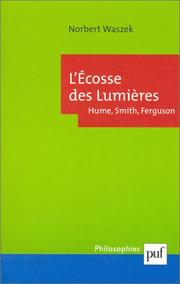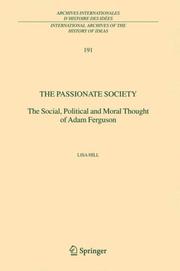| Listing 1 - 4 of 4 |
Sort by
|
Book
ISBN: 9781474413275 1474413277 9781474413282 9781474413299 Year: 2019 Publisher: Edinburgh Edinburgh University Press
Abstract | Keywords | Export | Availability | Bookmark
 Loading...
Loading...Choose an application
- Reference Manager
- EndNote
- RefWorks (Direct export to RefWorks)
Adam Ferguson, a friend of David Hume and Adam Smith, was among the leading Scottish Enlightenment figures who worked to develop a science of man. He created a methodology for moral science that combined empirically based social theory with normative moralising. He was among the first in the English-speaking world to make use of the terms civilization, civil society and political science.Craig Smith explores Ferguson's thought, and examines his attempt to develop a genuine moral science and its place in providing a secure basis for the virtuous education of the new elite of Hanoverian Britain. The Ferguson that emerges is far from the stereotyped image of a republican sceptical about commercial society and much closer to the mainstream of the Scottish Enlightenment and its defence of the new British commercial order
Enlightenment --- Civil society --- Moral and ethical aspects --- Ferguson, Adam, --- General ethics --- Ferguson, Adam --- Enlightenment - Moral and ethical aspects - Scotland --- Ferguson, Adam, - 1723-1816
Book
ISBN: 0674075285 0674075269 9780674075269 9780674072961 0674072960 9780674075283 Year: 2013 Publisher: Cambridge, MA
Abstract | Keywords | Export | Availability | Bookmark
 Loading...
Loading...Choose an application
- Reference Manager
- EndNote
- RefWorks (Direct export to RefWorks)
Although overshadowed by his contemporaries Adam Smith and David Hume, the Scottish philosopher Adam Ferguson strongly influenced eighteenth-century currents of political thought. A major reassessment of this neglected figure, Adam Ferguson in the Scottish Enlightenment: The Roman Past and Europe's Future sheds new light on Ferguson as a serious critic, rather than an advocate, of the Enlightenment belief in liberal progress. Unlike the philosophes who looked upon Europe's growing prosperity and saw confirmation of a utopian future, Ferguson saw something else: a reminder of Rome's lesson that egalitarian democracy could become a self-undermining path to dictatorship. Ferguson viewed the intrinsic power struggle between civil and military authorities as the central dilemma of modern constitutional governments. He believed that the key to understanding the forces that propel nations toward tyranny lay in analysis of ancient Roman history. It was the alliance between popular and militaristic factions within the Roman republic, Ferguson believed, which ultimately precipitated its downfall. Democratic forces, intended as a means of liberation from tyranny, could all too easily become the engine of political oppression-a fear that proved prescient when the French Revolution spawned the expansionist wars of Napoleon. As Iain McDaniel makes clear, Ferguson's skepticism about the ability of constitutional states to weather pervasive conditions of warfare and emergency has particular relevance for twenty-first-century geopolitics. This revelatory study will resonate with debates over the troubling tendency of powerful democracies to curtail civil liberties and pursue imperial ambitions.
Enlightenment --- Republicanism --- Political science --- History. --- Ferguson, Adam, --- Gentleman in the country, --- Great Britain --- Rome --- England --- Politics and government. --- Politics and government --- History --- Republicanism - Rome - History --- Enlightenment - Scotland --- Ferguson, Adam, - 1723-1816 --- Rome - Politics and government --- Great Britain - Politics and government

ISBN: 2130524494 9782130524496 Year: 2003 Volume: 161 Publisher: Paris PUF
Abstract | Keywords | Export | Availability | Bookmark
 Loading...
Loading...Choose an application
- Reference Manager
- EndNote
- RefWorks (Direct export to RefWorks)
Hume, David --- Ferguson, Adam --- Smith, Adam --- Hume, David, --- Smith, Adam, --- Ferguson, Adam, --- Criticism and interpretation --- Scotland --- Ecosse --- Intellectual life --- Vie intellectuelle --- Criticism and interpretation. --- Smith, Adam, - 1723-1790 --- Ferguson, Adam, - 1723-1816 --- Hume, David, 1711-1776 --- ECOSSE (GRANDE-BRETAGNE) --- SIECLE DES LUMIERES --- HUME (DAVID), PHILOSOPHE ANGLAIS, 1711-1776 --- SMITH (ADAM), 1723-1790 --- FERGUSON (ADAM), 1724-1800 --- VIE INTELLECTUELLE --- CRITIQUE ET INTERPRETATION --- 18E SIECLE --- Smith, Adam, - 1723-1790.

ISBN: 1402038895 9781402038891 9786610634569 1280634561 1402038909 Year: 2006 Volume: 191 Publisher: Dordrecht Springer
Abstract | Keywords | Export | Availability | Bookmark
 Loading...
Loading...Choose an application
- Reference Manager
- EndNote
- RefWorks (Direct export to RefWorks)
Adam Ferguson (1723-1816) was a major figure of the Scottish Enlightenment whose thought was, in many respects, original and distinctive. This book is a study of his ideas and of the intellectual forces that shaped them. Though somewhat overlooked in the nineteenth century, Ferguson was rescued from obscurity in the first half of the twentieth century by scholars interested in the origins of sociology and early critiques of modernity. Ferguson’s interest in the mechanics of social life and especially social change led him to many groundbreaking insights. In fact, he is sometimes identified as the 'Father of Modern Sociology'. In addition to exploring whether or not he merits this title, this study examines the whole of Ferguson’s thought as a system and includes his moral and faculty psychology, historiography, theology, politics and social science. Ferguson is distinguished by his deep appreciation of the complexity of the human condition; his study of society is based on the belief that it is not only reason, but the unseen, unplanned, sub-rational and visceral forces that keep the human universe in motion. Ferguson’s appreciation of this fact, and his ability to make social science of it, is his major achievement.
Philosophy, Scottish --- Philosophie écossaise --- Ferguson, Adam, --- Sociology --- Philosophy. --- Criticism and interpretation --- Economics. --- History. --- Political science. --- Sociology. --- Philosophy --- Social Change --- Sociology & Social History --- Philosophy & Religion --- Social Sciences --- Social sciences. --- Political sociology. --- Enlightenment --- Scotland --- Intellectual life --- Philosophie écossaise --- EPUB-LIV-FT LIVSOCIA SPRINGER-B --- Mass political behavior --- Political behavior --- Political science --- Behavioral sciences --- Human sciences --- Sciences, Social --- Social science --- Social studies --- Sociological aspects --- Gentleman in the country, --- Political philosophy. --- Economic history. --- Social Sciences. --- Sociological Theory. --- Sociology, general. --- History, general. --- Political Philosophy. --- Methodology/History of Economic Thought. --- Political Science. --- Criticism and interpretation. --- Civilization --- History of Economic Thought/Methodology. --- Administration --- Civil government --- Commonwealth, The --- Government --- Political theory --- Political thought --- Politics --- Science, Political --- Social sciences --- State, The --- Economic conditions --- History, Economic --- Economics --- Political philosophy --- Annals --- Auxiliary sciences of history --- Social theory --- Sociology - Philosophy. --- Ferguson, Adam, - 1723-1816 - Criticism and interpretation --- Political science—Philosophy. --- Economics—History. --- History of Economic Thought and Methodology. --- Sciences sociales --- Sociologie politique --- Philosophie des lumieres --- Ecosse (grande-bretagne) --- 18e siecle --- Vie intellectuelle --- Ferguson, Adam, - 1723-1816
| Listing 1 - 4 of 4 |
Sort by
|

 Search
Search Feedback
Feedback About UniCat
About UniCat  Help
Help News
News